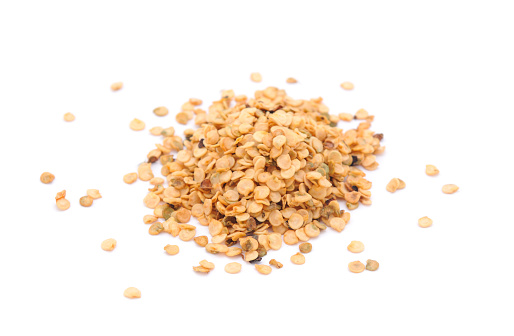Paprika/bell pepper seed oil
Oil extraction
Traditionally, the seeds are first removed from the bell pepper fruit and stored to dry. After a week, they are ground and then the oil is chemically extracted from the meal.
In order to obtain a higher quality oil, the seeds are de-oiled without chemical extraction, purely mechanically. In this process, the seeds are completely or partially separated from the hull. A mixture of about 5% shell in the seeds may be desirable for a more intense color. The cleaned and dried seeds are fed to a press and efficiently de-oiled.
In Korea, it is still common to roast the seeds before mechanical pressing.
Characteristics and shelf life
Bell pepper seed oil is golden yellow to red. It has a faint scent of bell peppers. If the seeds are roasted before being pressed, the resulting oil smells nutty or like peanuts. Taste-wise, it is pleasantly nutty and, depending on the method of production, can taste mild or spicy. This oil has a solidification point of -14°C. Its fatty acid composition is as follows: It contains over 80% unsaturated fatty acids, the largest percentage of which is made up of approx. 67-75% linoleic acid and about 9-15% oleic acid. The amount of saturated fatty acids in the oil is relatively low, with palmitic acid around only 13%, stearic acid around 3-4%, and palmitoleic acid around 0.3%.
Bell pepper seed oil should be stored in a cooled, dark location to extend its shelf life.
Use
Bell pepper seed oil can be used in various ways. For instance, it constitutes a good basis for cooking and salad oils and is also a good war material for the manufacture of margarine. Due to its uniquely pungent taste, it is especially well suited for seasoning meat, salads, quark, and various other dishes. In different areas it can also be used as a substitute for other oils featuring a similarly high unsaturated fatty acid content. The bell pepper seed oil specially prepared in Korea (the seeds are roasted, pressed, and then the oil is extracted) is primarily and commonly used there to season different dishes.
We will be happy to advise you on this seed and show you options. Contact us
In addition to their own knowledge acquired through press trials, the following sources were used to create the article:
- Öle, natürlich kaltgepresst, Basiswissen & Rezepte, Marcus Hartmann, Hädecke, 2008
- Heilende Öle, Pflanzenöle als Nahrungs- und Heilmittel, Neue Erkenntnisse, Günter Albert Ulmer Verlag Tuningen
- Lexikon der pflanzlichen Fette und Öle, Krist, Buchbauer, Klausberger, SpringerWienNewYork, 2008
- www.wikipedia.de
- en.wikipedia.org

